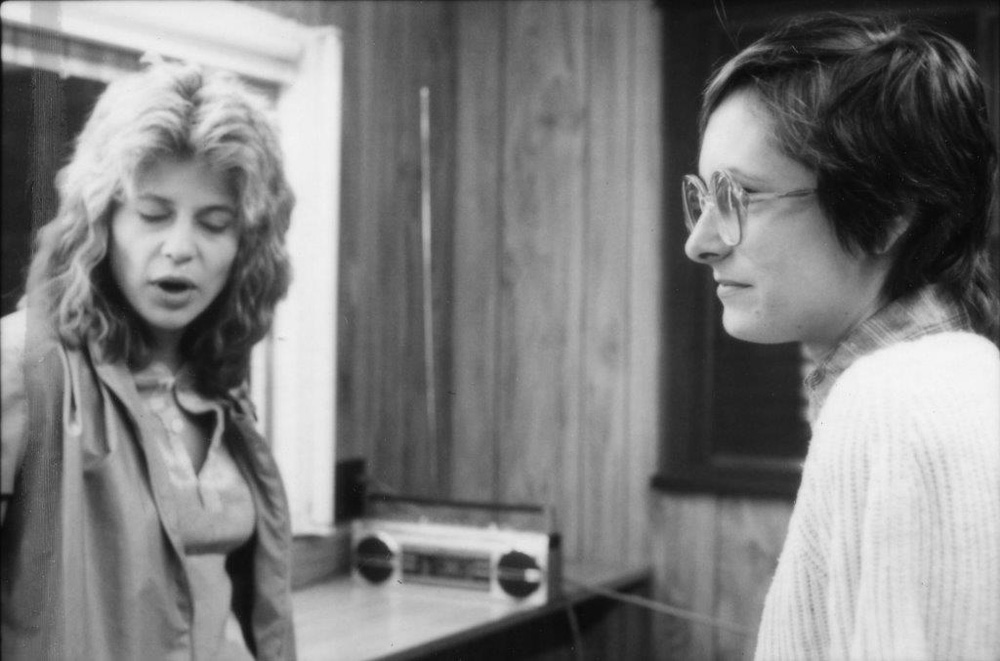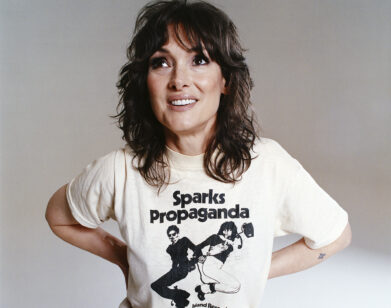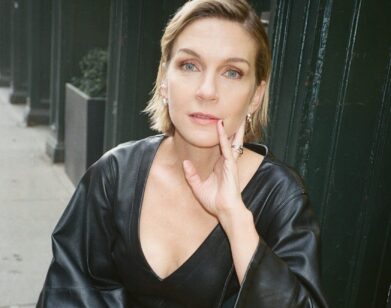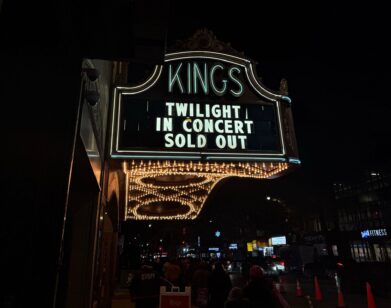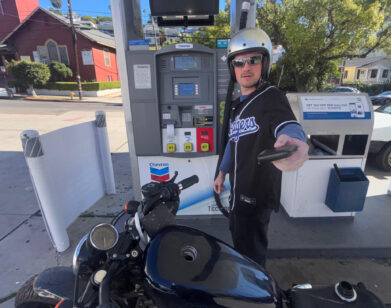Gale Anne Hurd
In the early 1980s, a twentysomething former assistant named Gale Anne Hurd and an art department wiz friend of hers tried to shop the sci-fi script they’d written together to studios. They were turned down … 99 times. But because Hollywood loves an underdog story, even in real life, on their hundredth attempt to find funding, Hurd and her soon-to-be husband, James Cameron, hit pay dirt. Their film, The Terminator (1984), went on to make $78 million at the box office worldwide.
If it seems strange to characterize the making of a massively successful franchise as a scrappy pull-yourself-up-by-your-motorcycle-boots story, it is worth noting that The Terminator came at the tail end of—and was very much a part of—the first wave of real blockbusters, when the handmade tactility of even sci-fi epics was still a thing. Scrappiness forms the foundation of Hurd’s work ethic. In her first job in the industry, as the executive assistant to legendary producer (and, as legendarily, filmmaker-mentor extraordinaire) Roger Corman, Hurd learned a variety of filmmaking skills while trying them out on actual movies—which is a bit like learning to throw a baseball on the mound in a championship game. Hurd would later say of the experience, “Roger did teach me that you can do just about everything; all you need is some wire and some grip tape.”
In the years since, Hurd, now 61, has in fact done just about everything—producing, in addition to two Terminator sequels, some two dozen sci-fi spectacles for the big screen, as well as the television phenomenon The Walking Dead (and its spin-off Fear the Walking Dead), and her newest show, USA Network’s dreamy mystery Falling Water. In February, Hurd took a moment to talk to her friend, the actress Yvette Nicole Brown—herself a Walking Dead obsessive who has appeared on the recap show, Talking Dead, more than any other outside guest—about making monsters in her work and finding connections in her subconscious.
YVETTE NICOLE BROWN: I’m so excited to be talking to you. I just did a dance.
GALE ANNE HURD: [laughs] I love your dances. You’re very much like Ellen DeGeneres, but different.
BROWN: You and I probably have more in common. We both studied communications in college, and we also both started out as executive assistants. Do you think there is something you learned as an assistant that helped you through the rest of your career?
HURD: Well, it would have been a much different experience for me had I worked for anyone other than Roger Corman. When I started with him in 1978, the very first thing he asked me in the job interview was, “What kind of career do you want to pursue in the industry?” That was not a typical interview question for a woman applying for an administrative assistant position in 1978.
BROWN: Or now in 2017!
HURD: Right. Roger never perceived someone’s limitations. To this day, he only recognizes people’s inherent ambitions and talent. And he rewards them by moving them up very quickly.
BROWN: But there also had to be something you saw within yourself.
HURD: You’re giving me too much credit. The truth is, there were very few role models for women, certainly producers, back then. I developed them very quickly once I was in the industry, but before that I saw my future in an office, maybe capping out at director of development.
BROWN: My mom was a secretary.
HURD: So was my mother!
BROWN: I remember when I first got out to L.A., my dad said to me, “Don’t be afraid to surpass your mother.” And that resonated with me. It kind of opened up everything for me. What did you learn working for Roger?
HURD: I learned that I’m a fairly quick study. As his assistant, you never knew what you were going to do next. One day I would be casting a film, another day I could be out location scouting, and the next day I’d be looking at a director’s rough cut and preparing notes. The most important thing I learned was that if you don’t know what you’re being asked to do, make sure you clarify. I wasted a lot of time, early on, not understanding completely. I think people in every business are afraid to ask questions.
BROWN: On the acting side, they actually tell us to lie about things that we don’t know and later scramble to learn. “Do you ride horses?” “Yes, I do.” I think scrambling is the death of most of us in the industry.
HURD: Absolutely. The other key ingredient to success, I learned, is relying on not only the kindness of strangers, but the kindness of colleagues. It wasn’t the backstabbing industry that I had been warned about. There were so many kind, generous, and supportive people without whom I never would have succeeded. To this day, I would rather be naive and believe the best in someone than assume everyone is out to get me.
BROWN: You have three shows going right now: The Walking Dead, Fear the Walking Dead, and Falling Water. And Lore is coming, so we’ll say four. What is your typical day?
HURD: I have lots of frequent flier miles. Generally I try to be on set as much as possible, especially during the early part of a season. I read all of the outlines and scripts and look at the auditions and the cuts for my other shows and give notes on all of that. On The Walking Dead, [co-executive producer] Denise Huth and I look at all the behind-the-scenes material, all of the recaps, and all of the promos for next week’s episodes. There’s a lot to do, but I enjoy nothing more than being on set because that’s where the magic happens.
BROWN: Wow, worker bees for real. I have just been able to start my proper binge of Falling Water. I can binge-watch a show in a day or so, but when I come across one like Falling Water, I need a notebook. I literally have color-coded note cards because I need to understand how it all fits together. It’s multicultural, which I know is very important to you, and I love that at its core it’s about relationships: a lost child, a sick mother.
HURD: When the creators Blake Masters and the late Henry Bromell—sadly, he passed away before we even got the green light—pitched it to me, I loved that it was about the sense of loss that all of us have. The loss of connection and this deep-seated search for meaning in our lives. And the fact that we use so little of our brains, of our ability, our cognition. In my completely layperson’s perspective, maybe the rest is being used by our subconscious.
BROWN: It has to be.
HURD: I think that we can learn so much if we pay attention to our dreams, whether when we are asleep or in waking dreams. There are connections that are absolutely incredible. Yesterday when I found out that Bill Paxton, one of the dearest people on the planet, had passed away, I had been thinking about a friend of mine—and then she called me. She said, “You’ve been thinking about me, haven’t you? I can feel it.” I think we’re all seeking those personal connections, especially as our devices continue to separate us.
BROWN: You’ve talked about your late friend Debra Hill, how she was there to advise and support you, and I wanted to know more about that mentorship. Was that something you sought out?
HURD: With Debra, it was absolutely organic. I met her through Women in Film, which, beginning in the ’70s and continuing to this day, has played such a powerful role in bringing women together, helping us realize that we are stronger together, that we shouldn’t look at it like we’re competing for one position. Debra and I bonded over our love of science fiction, fantasy, and horror. There weren’t a lot of women in that space back in the ’70s and ’80s. Halloween [1978], which she not only produced but also co-wrote, is one of the seminal horror films. And when she and John Carpenter were making Escape From New York [1981], they hired Jim [James Cameron] to be the visual effects supervisor. A lot of people forget that Jim can probably do any on-set job better than the person he’s hired to do it.
BROWN: He developed a camera to go down and explore the Titanic.
HURD: And then he co-designed the submersible to go down to the bottom of the Mariana Trench. So, anyway, Debra and I developed a friendship. She was one of those people who, even if you didn’t see her for a year and a half, you could pick things right up as if you’d spent all that time together. And when she was dying of cancer and had to have her legs amputated, all she cared about was how I was doing, how my husband was doing, how other people were doing. She was the most selfless, talented, most compassionate and supportive woman I’ve ever met in the industry. That’s why at the producer’s guild there’s the Debra Hill Fellowship, which we do in concert with Women in Film to inspire people to follow her lead, and to make sure her legacy is not lost.
BROWN: You were once asked whether you ever thought about directing, and your response was, “When you realize there are geniuses out there and you’d be a journeyman … that’s not good enough. I’d rather be the person helping those who are one in a billion get their vision out.”
HURD: The people green-lighting films or TV series often want household names, but the smart ones realize that there are lightning rods who can make things happen, and they aren’t necessarily the ones who are celebrated. That’s why it’s so important to shine the spotlight on people like Denise because she’s there every day making the magic happen.
BROWN: I believe there are two types of decision-makers—those who lead with their gut and those who make lists of pros and cons, and fully anticipate the consequences. Which one are you?
HURD: I’m gut all the way, which is why I think I’m so connected to shows like Falling Water and even The Walking Dead, which is all about the mortal consequences of our actions. Generally, we act first and realize the consequences later. And I think there is nothing that can replace your emotional response. The biggest mistakes I have ever made in my life are when people told me, “You really should produce this. It’s a guaranteed hit.” I would read the material and I would go, “I don’t get it, but okay, I’ll produce it.” You’re giving up that much of your life, your time with family and friends, to something that you’re not really committed to—and they did not pan out the way everyone said they would, even though I worked just as hard. From that point on, I thought, “If I’m going to fail, let me fail with something that I care deeply about.”
BROWN: What is the best piece of advice you have ever received?
HURD: After Jim and I had all that unexpected success with The Terminator, Roger Corman took me to lunch and said, “Now, Gale, I want you to know, and listen to me when I’m saying this: The Terminator is not a fluke. You are a talented producer even if the next one and the next one after that don’t work out. Continue to believe in yourself because I believe in you, and I know that you will have a long, successful career.”
BROWN: A lot of my belief about what women can do, female empowerment, that’s The Terminator for me.
HURD: Look at the journey of Sarah Connor: she works as a waitress, she doesn’t know what she’s going to do with her life, and then finds out that she is the key to the continuation of the human race in the war against the machines. And she finds the strength within herself to take it on. We all have that strength. She’s not just a character in a movie. We need to empower ourselves and believe in ourselves, and not allow the world to take that away from us. No matter how dark we may think our world is, it’s been much darker in the past, and we will make it through this.
YVETTE NICOLE BROWN IS A LOS ANGELES–BASED ACTRESS BEST KNOWN FOR HER ROLE ON THE NBC SERIES COMMUNITY. SHE IS THE HOST OF THE NEW SYFY COMPETITION SERIES COSPLAY MELEE, WHICH PREMIERED IN MARCH.

